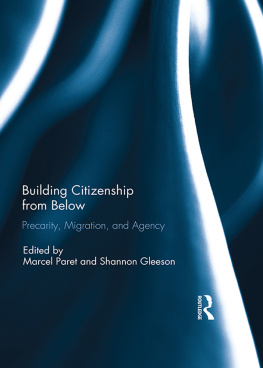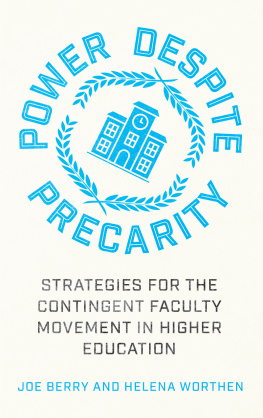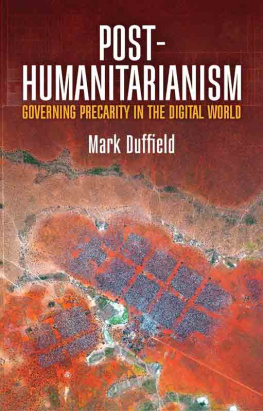Precarity Lab - Technoprecarious
Here you can read online Precarity Lab - Technoprecarious full text of the book (entire story) in english for free. Download pdf and epub, get meaning, cover and reviews about this ebook. publisher: MIT Press, genre: Politics. Description of the work, (preface) as well as reviews are available. Best literature library LitArk.com created for fans of good reading and offers a wide selection of genres:
Romance novel
Science fiction
Adventure
Detective
Science
History
Home and family
Prose
Art
Politics
Computer
Non-fiction
Religion
Business
Children
Humor
Choose a favorite category and find really read worthwhile books. Enjoy immersion in the world of imagination, feel the emotions of the characters or learn something new for yourself, make an fascinating discovery.
- Book:Technoprecarious
- Author:
- Publisher:MIT Press
- Genre:
- Rating:5 / 5
- Favourites:Add to favourites
- Your mark:
- 100
- 1
- 2
- 3
- 4
- 5
Technoprecarious: summary, description and annotation
We offer to read an annotation, description, summary or preface (depends on what the author of the book "Technoprecarious" wrote himself). If you haven't found the necessary information about the book — write in the comments, we will try to find it.
Technoprecarious — read online for free the complete book (whole text) full work
Below is the text of the book, divided by pages. System saving the place of the last page read, allows you to conveniently read the book "Technoprecarious" online for free, without having to search again every time where you left off. Put a bookmark, and you can go to the page where you finished reading at any time.
Font size:
Interval:
Bookmark:

Technoprecarious
Technoprecarious
Precarity Lab

Copyright 2020 Goldsmiths Press
First published in 2020 by Goldsmiths Press
Goldsmiths, University of London, New Cross
London SE14 6NW
Printed and bound by Versa Press
Distribution by the MIT Press
Cambridge, Massachusetts, and London, England
Copyright 2020 Precarity Lab
The right of the individual contributors to be identified as the authors of this work has been asserted by them in accordance with sections 77 and 78 of the Copyright, Designs and Patents Act 1988.
Every effort has been made to trace copyright holders and to obtain their permission for the use of copyright material. The publisher apologizes for any errors or omissions and would be grateful if notified of any corrections that should be incorporated in future reprints or editions of this book.
All Rights Reserved. No part of this publication may be reproduced, distributed or transmitted in any form or by any means whatsoever without prior written permission of the publisher, except in the case of brief quotations in critical articles and review and certain non-commercial uses permitted by copyright law.
A CIP record for this book is available from the British Library
ISBN 978-1-912685-98-1 (pbk)
ISBN 978-1-912685-70-7 (ebk)
www.gold.ac.uk/goldsmiths-press

d_r0
Contents
We would like to thank all members, writers, and kindred spirits of the Precarity Lab network, who have made the writing and book-making possible under very unique creative circumstances. We would like to thank our book sprint facilitator, Faith Bosworth of BookSprints.net, for making sure that our group left our sprint with a completed book draft. Faith, you were really the person we needed when we needed it, and deserve much credit for everything good in here. We would also like to thank the University of Michigans Humanities Collaboratory project, and especially Peggy McCracken, Kristin Hass, and Sheri Sytsema-Geiger for believing in this project and making sure that everyone was paid and otherwise taken care of. Finally, we extend our sincere thanks to Casidy Campbell and Sarah Snyder for all their support work, and to Irina Aristarkhova and Tung Hui-Hu for their contributions to our thinking and writing. We would also like to thank sister projects with similar aims and ethos, including After Oil, Ecology of Networks, Matsutake Worlds, and the Mukurtu archive.
Finally, thank you to our long-term research collaborators, colleagues, and fellow workers across the globe, especially in the Navajo Nation, Detroit, Palestine, China, Mexico, and Indonesia, whose insights and friendship have shaped our thinking and made this work possible.
Cassius Adair (he/him) is an independent scholar and radio producer from Virginia. He is writing a book about transgender people and the internet and editing a book of speculative fiction about the academy.
Ivn Chaar Lpez (he/him) is an Assistant Professor in American Studies and the principal investigator of the Border Tech Lab at the University of Texas, Austin. His work engages the fields of digital media studies, Latina/o studies, and STS. He is currently writing a book on the intersecting histories of unmanned aerial systems, cybernetics, and boundary-making along the USMexico border.
Anna Watkins Fisher (she/her) is an Assistant Professor of American Culture at the University of Michigan, Ann Arbor and a founding member of the Precarity Lab collective. Her first book, The Play in the System: The Art of Parasitical Resistance (2020), theorizes parasitism as an ambivalent tactic of resistance in twenty-first-century art and politics. She is also the co-editor, with Wendy Hui Kyong Chun, of New Media, Old Media: A History and Theory Reader (2nd edn, Routledge, 2015).
Meryem Kamil (she/her) is Assistant Professor of Film and Media Studies at the University of California, Irvine. Her work examines new media as a tool for anti-colonial Palestinian organizing.
Cindy Lin (she/her) is a PhD candidate in the School of Information at the University of Michigan, Ann Arbor and a certificate holder in the Science, Technology, and Society (STS) program. Her research and writing draw on long-term fieldwork with state science agencies and commercial services firms to examine the politics of computational labor and data architectures for peatland fire control in Indonesia.
Silvia Lindtner (she/her) is an Assistant Professor of Information, Digital Studies, and Science, Technology, and Society (STS) at the University of Michigan. She is the Associate Director of the Center for Ethics, Society, and Computing (ESC) and a founding member of Precarity Lab. Her forthcoming book Prototype Nation: China and the Contested Promise of Innovation (2020) unpacks in ethnographic and historical detail how a growing distrust in Western models of progress and development, including Silicon Valley and the tech industry after the financial crisis of 20072008, shaped the rise of the global maker movement and the vision of China as a new frontier of innovation.
Lisa Nakamura (she/her) is Gwendolyn Calvert Baker Collegiate Professor of American Culture at the University of Michigan, Ann Arbor. She is the inaugural Director of the new Digital Studies Institute at the University of Michigan and a founding member of the Precarity Lab collective (precaritylab.org). She is the author of four books on race, gender, and digital media and gaming.
Cengiz Salman (he/him) is a PhD candidate in the Department of American Culture (Digital Studies) at the University of Michigan, Ann Arbor. His research broadly focuses on the relationship between digital media, algorithms, unemployment, and racial capitalism. He holds a Master of Arts degree in Social Science from the University of Chicago (2013), and a Bachelor of Arts degree in Anthropology with a specialization in Muslim Studies from Michigan State University (2011). Salman is a recipient of a Fulbright IIE Award, which he used to conduct research on urban transformation projects in Turkey from 2011 to 2012.
Kalindi Vora (she/her) is Professor of Gender, Sexuality and Womens Studies at the University of California, Davis. She is author of Life Support: Biocapital and the New History of Outsourced Labor (2015), and, with Neda Atanasoski, Surrogate Humanity: Race, Robots and the Politics of Technological Futures (2019). She has edited anthologies and published articles in journals such as Radical Philosophy, Ethnos: Journal of Anthropology, Current Anthropology, Social Identities, The South Atlantic Quarterly, Postmodern Culture, and Catalyst: Feminism, Theory, Technoscience.
Jackie Wang (she/her) is a black studies scholar, poet, multimedia artist, and an Assistant Professor of Culture and Media at the New Schools Eugene Lang College. She received her PhD in African and African American Studies at Harvard University and was recently a fellow at the Radcliffe Institute for Advanced Study. She is the author of Carceral Capitalism (2018), a book on the racial, economic, political, legal, and technological dimensions of the US carceral state. She has also published a number of punk zines, including
Font size:
Interval:
Bookmark:
Similar books «Technoprecarious»
Look at similar books to Technoprecarious. We have selected literature similar in name and meaning in the hope of providing readers with more options to find new, interesting, not yet read works.
Discussion, reviews of the book Technoprecarious and just readers' own opinions. Leave your comments, write what you think about the work, its meaning or the main characters. Specify what exactly you liked and what you didn't like, and why you think so.










